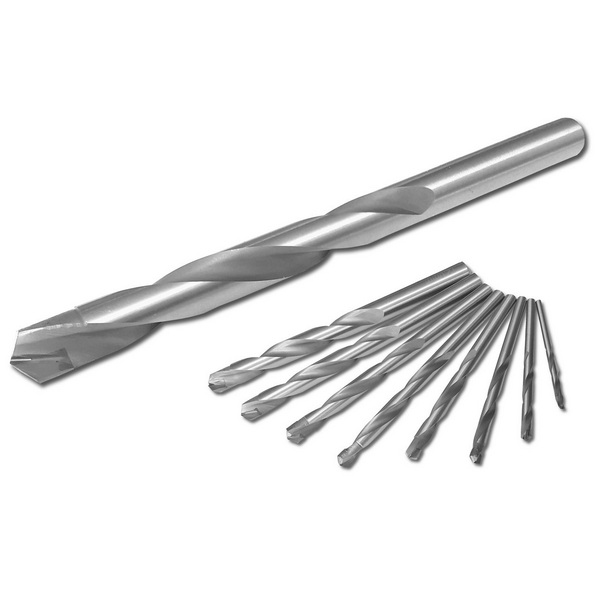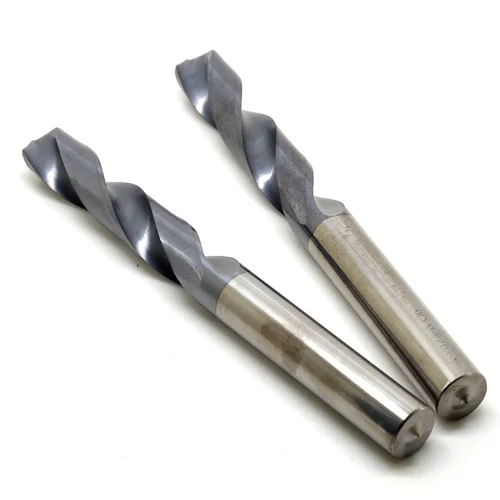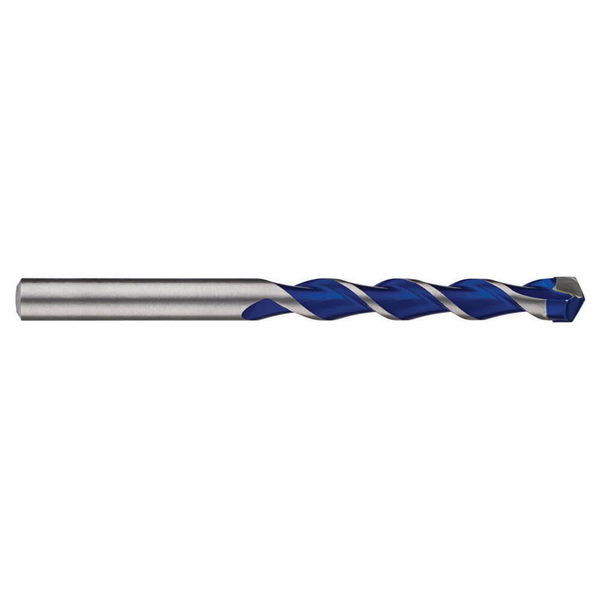Content Menu
● Introduction to Tungsten Carbide Drill Bits
>> Manufacturing Process
● Key Features and Benefits
>> Exceptional Hardness and Wear Resistance
>> Heat Resistance
>> Versatility
>> Precision and Clean Cuts
>> Long Service Life
● Comparing Tungsten Carbide Drill Bits to Other Types
● Choosing the Best Tungsten Carbide Drill Bit
>> 1. Application
>> 2. Tip Geometry
>> 3. Shank Type
>> 4. Size and Length
>> 5. Brand Reputation and Quality
● Top Tungsten Carbide Drill Bits on the Market
>> Speed Tiger Carbide Drill Bits
>> Chain Headway Tungsten Carbide Drill Bits
>> Ruwag Carbide Bits
● Common Mistakes to Avoid When Using Tungsten Carbide Drill Bits
>> 1. Using the Wrong Bit for the Material
>> 2. Drilling at Incorrect Speeds
>> 3. Skipping Lubrication
>> 4. Excessive Pressure
>> 5. Neglecting to Secure the Workpiece
● Innovations and Future Trends in Tungsten Carbide Drill Bits
>> 1. Advanced Coatings
>> 2. Smart Geometry
>> 3. Integration with CNC and Automation
>> 4. Eco-Friendly Manufacturing
>> 5. Customization
● Conclusion
● FAQ
>> 1. What materials can tungsten carbide drill bits cut through?
>> 2. Are solid carbide drill bits better than carbide-tipped bits?
>> 3. How do I prevent my tungsten carbide drill bit from breaking?
>> 4. Can I use tungsten carbide drill bits with a standard hand drill?
>> 5. How do I know when to replace my tungsten carbide drill bit?
● Citations:
When it comes to drilling through the toughest materials—such as hardened steel, masonry, ceramics, and composites—nothing matches the performance and durability of tungsten carbide drill bits. But with a market flooded with options, how do you determine which is truly the best tungsten carbide drill bit for your needs? This comprehensive guide will explore the science behind tungsten carbide, compare leading products, and provide expert advice to help you make an informed decision.

Introduction to Tungsten Carbide Drill Bits
Tungsten carbide drill bits are the gold standard for professionals and serious DIYers who need to cut through the hardest materials. Unlike standard high-speed steel (HSS) or even cobalt bits, tungsten carbide bits are engineered to maintain sharpness, resist heat, and deliver precise, clean holes in challenging substrates like concrete, tile, and hardened steel.
Tungsten carbide is a compound formed by combining equal parts tungsten and carbon, resulting in a material nearly as hard as diamond (Mohs hardness 9-9.5). Most drill bits marketed as "carbide" are actually steel bits with a tungsten carbide tip, though some are solid carbide for maximum hardness.
Manufacturing Process
- Powder Metallurgy: Tungsten and carbon powders are mixed, pressed into shape, and sintered at high temperatures.
- Tipping: For carbide-tipped bits, the tungsten carbide tip is brazed onto a steel shank.
- Finishing: The bit is ground to precise angles and flute shapes for chip removal and cutting efficiency.
This meticulous process ensures that the resulting drill bits are not only incredibly hard but also capable of withstanding the rigors of high-speed, high-pressure drilling.
Key Features and Benefits
Exceptional Hardness and Wear Resistance
Tungsten carbide is approximately five times harder than steel, making these bits ideal for tough materials. They maintain sharpness far longer than HSS or cobalt bits, reducing downtime for sharpening or replacement.
Heat Resistance
Carbide bits can withstand much higher temperatures, allowing for faster drilling speeds and less risk of bit failure due to overheating.
Versatility
These bits are suitable for drilling metals (including stainless and hardened steel), masonry, ceramics, glass, and composites, making them a versatile addition to any toolkit.
Precision and Clean Cuts
Advanced tip geometries (often 135°–140° point angles) ensure accurate starts and minimize wandering, even on hard, slick surfaces.
Long Service Life
Because of their durability, tungsten carbide bits offer a lower cost per hole compared to cheaper bits, thanks to their extended lifespan and reduced need for replacement.
Comparing Tungsten Carbide Drill Bits to Other Types
| Feature | HSS Bits | Cobalt Bits | Titanium Bits | Tungsten Carbide Bits |
| Hardness | Good | Better | Good | Best |
| Heat Resistance | Moderate | High | Moderate | Excellent |
| Suitable for Masonry | No | No | No | Yes |
| Suitable for Hardened Steel | No | Yes | No | Yes |
| Cost | Low | Medium | Medium | High |
| Lifespan | Short | Medium | Medium | Longest |
Choosing the Best Tungsten Carbide Drill Bit
With so many options, selecting the best tungsten carbide drill bit requires consideration of several factors:
1. Application
- Metalworking: Choose bits with robust carbide tips and optimized flute designs for chip removal.
- Masonry/Concrete: Look for SDS or rotary hammer-compatible bits with reinforced carbide heads.
- Tile/Glass: Select spear-point or diamond-ground carbide tips for clean entry and minimal chipping.
2. Tip Geometry
- Point Angle: 135°–140° point angles are standard for hard materials, providing better centering and reduced walking.
- Flute Design: Spiral or multi-flute designs help evacuate chips and reduce heat buildup.
3. Shank Type
Ensure compatibility with your drill (round, hex, SDS-plus, etc.) for optimal performance and safety.
4. Size and Length
Select the diameter and length suited to your project. Longer bits are available for deep drilling, but require careful handling to avoid breakage.
5. Brand Reputation and Quality
Opt for reputable manufacturers with consistent quality control and positive user feedback.

Top Tungsten Carbide Drill Bits on the Market
Speed Tiger Carbide Drill Bits
- For Stainless Steel: SN series (135° point, 3xD/5xD depth, 3–16mm sizes)
- For High Hardness Steel: HD series (140° point, 3xD depth, 3–14mm sizes)
- For General Use/Cast Iron: PK and PKC series (135°–140° points, 5xD/8xD depth, 3–14mm sizes)
Chain Headway Tungsten Carbide Drill Bits
- Unique Geometry: 140° point angle, no spot holes required, internal coolant for chip removal and cooling.
- Specialized for Hardened Steel: Multi-layer geometry for improved chip removal, high wear resistance, and reduced edge breakage.
Ruwag Carbide Bits
- General Purpose: Suitable for masonry, metals, and heavy-duty applications. Offers a range of shank types and tip geometries.
- Use the Correct Speed: Carbide bits work best at higher speeds, but always consult the manufacturer's recommendations for the specific material.
- Apply Steady Pressure: Avoid excessive force, which can cause brittle carbide to chip or break.
- Coolant/Lubrication: Use coolant or cutting oil for metals to prolong bit life and improve finish.
- Proper Storage: Store bits in a dry, organized case to prevent chipping and corrosion.
- Inspect Regularly: Check for wear or damage before use; replace bits showing signs of dullness or chipping.
Common Mistakes to Avoid When Using Tungsten Carbide Drill Bits
Even the best drill bit can fail if not used properly. Here are some common mistakes to avoid:
1. Using the Wrong Bit for the Material
Tungsten carbide bits are versatile, but using a masonry bit on metal or a metal bit on tile can lead to premature wear or breakage. Always match the bit to the material.
2. Drilling at Incorrect Speeds
Drilling too fast or too slow can overheat the bit or cause it to bind. Follow the manufacturer's speed recommendations for the best results.
3. Skipping Lubrication
When drilling metals, lubrication is essential to reduce heat and friction. Skipping this step can drastically reduce bit life.
4. Excessive Pressure
Carbide is hard but brittle. Applying too much pressure can cause the tip to chip or snap. Let the bit do the work.
5. Neglecting to Secure the Workpiece
A moving workpiece can cause the bit to wander or break. Always clamp your material securely before drilling.
Innovations and Future Trends in Tungsten Carbide Drill Bits
The world of cutting tools is constantly evolving, and tungsten carbide drill bits are no exception. Here are some of the latest innovations and trends shaping the industry:
1. Advanced Coatings
Modern carbide bits often feature coatings such as titanium nitride (TiN), titanium aluminum nitride (TiAlN), or diamond-like carbon (DLC). These coatings further enhance hardness, reduce friction, and extend tool life.
2. Smart Geometry
Manufacturers are developing new flute designs and tip geometries to improve chip evacuation, reduce heat, and allow for higher drilling speeds. These innovations help prevent clogging and improve efficiency.
3. Integration with CNC and Automation
As CNC machining becomes more prevalent, carbide drill bits are being optimized for automated processes, including coolant-through designs and sensors that monitor tool wear in real-time.
4. Eco-Friendly Manufacturing
Sustainability is becoming a priority, with some manufacturers using recycled carbide and environmentally friendly production methods to reduce their carbon footprint.
5. Customization
More companies now offer custom carbide drill bits tailored to specific applications, industries, or materials, ensuring optimal performance for unique drilling challenges.
Conclusion
Tungsten carbide drill bits are unmatched for drilling into hard, abrasive materials. Their exceptional hardness, heat resistance, and longevity make them the tool of choice for professionals and demanding DIYers alike. When selecting the best tungsten carbide drill bit, consider your application, the bit's geometry, shank compatibility, and the reputation of the manufacturer. Brands like Speed Tiger, Chain Headway, HUANA, and Ruwag offer top-tier options tailored to various needs and industries. With the right bit, you'll experience faster drilling, cleaner holes, and longer tool life—making your investment worthwhile.

FAQ
1. What materials can tungsten carbide drill bits cut through?
Tungsten carbide drill bits can cut through a wide range of tough materials, including hardened steel, stainless steel, cast iron, masonry, concrete, ceramics, glass, and composites.
2. Are solid carbide drill bits better than carbide-tipped bits?
Solid carbide bits offer maximum hardness and wear resistance but can be brittle and prone to breakage if misused. Carbide-tipped bits combine the toughness of steel with the hardness of carbide, making them less likely to break and suitable for most applications.
3. How do I prevent my tungsten carbide drill bit from breaking?
Use the correct speed and feed rate, avoid excessive pressure, ensure proper cooling or lubrication, and always use the right bit for the material. Carbide is hard but brittle, so careful handling is essential.
4. Can I use tungsten carbide drill bits with a standard hand drill?
Yes, many carbide-tipped bits are designed for use with standard hand drills. However, for optimal performance—especially in hard materials—using a drill press or rotary hammer is recommended.
5. How do I know when to replace my tungsten carbide drill bit?
Replace the bit if you notice significant dullness, chipping, or if it struggles to cut efficiently. Continuing to use a worn bit can damage your workpiece and the tool itself.
Citations:
[1] https://www.speedtigertools.com/solution/ins.php?index_id=102
[2] https://chainheadway.com/latest-news/tungsten-carbide-drill/
[3] http://www.thdrillingtools.com/blog/carbide-tipped-drill-bits-buyers-guide
[4] https://www.alamy.com/stock-photo/tungsten-carbide-tool.html
[5] https://huanatools.com/finding-the-best-carbide-drill-bits-for-hardened-steel/
[6] https://ruwag.co.za/blogs/news/everything-you-need-to-know-about-carbide-drill-bits
[7] https://www.reddit.com/r/Tools/comments/16wlyl8/what_is_the_best_carbide_drill_bit_set_for_the/
[8] https://www.bladesmithsforum.com/index.php?%2Ftopic%2F41502-tungsten-carbide-drill-bits%2F
[9] https://www.cousinsuk.com/category/tungsten-carbide-drill-bits
[10] https://ctpcryogenics.com/carbide-drill-bits/
[11] https://www.tivoly.com/en/choose-hss-drill-carbide-drill
[12] https://www.misterworker.com/en-us/blog/drill-bit-types-the-definitive-buying-guide-n369
[13] https://oneclearwinner.co.uk/product/drill-bits-tungsten-carbide/
[14] https://www.istockphoto.com/photos/tungsten-carbide-drill-bits
[15] https://www.midlandtool.com/blog/1184/carbide-drill-bits-everything-you-need-to-know
[16] https://www.youtube.com/watch?v=nABnb5HesvE
[17] https://www.screwfix.com/guides/tools/guide-to-types-of-drill-bits
[18] https://www.bosch-professional.com/gb/en/innovation/the-best-concrete-drill-bits/
[19] https://www.gettyimages.hk/detail/%E7%85%A7%E7%89%87/tungsten-carbide-machining-drill-bits-%E5%85%8D%E7%89%88%E7%A8%85%E5%9C%96%E7%89%87/1297149846?phrase=food
[20] https://gbdiystore.com/tct-drill-bits-tungsten-carbide-tip-precision-ground-hardplate-various-sizes
















